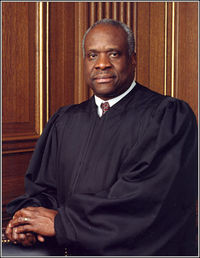Clarence Thomas is back in the news . . .
During a recent Meet the Press appearance, Harry Reid, the Senate minority leader, questioned Thomas’ competence as a Supreme Court justice and was subsequently accused of racism, which is pretty much guaranteed to happen if you say anything critical of a black man, woman or child.

Here’s what Reid actually said, and if you can find anything racial about it, you’re either smarter or crazier than I am:
I think he has been an embarrassment to the Supreme Court. I think his opinions are poorly written — I just don’t think he has done a good job.
Well, he has been an embarrassment, hasn’t he? It all started back at his confirmation hearing 13 years ago and the following exchange with Sen. Patrick Leahy:
SEN. LEAHY:
Judge, you entered law school — what? — 20 years ago this year. And in that 20 years, as both you and I would agree, there’s been some extraordinary cases in the Supreme Court. They’ve actually decided hundreds of cases, have made rulings, perhaps, in hundreds more in that 20 years, but — some may be routine, but some have been pretty significant cases.Just tell me, you know, help me know how you think. What would you consider a handful of the most important cases to have been decided by the Supreme Court since you became a law student 20 years ago?
(Pause)
JUDGE THOMAS:
Senator, it would be — to give you a running list, I would have to go back and give it some thought, but I certainly think that during the time that I was in law school, two of the cases that were considered the most significant cases or among the most significant cases would have been, certainly, Griggs [which] was decided while I was in law school, and —SEN. LEAHY:
(off mike) Did you say Griggs?JUDGE THOMAS:
Griggs, yes. And certainly, I think, Roe v. Wade.As you know, during that time when I was in law school, the — there was significant debate with respect to the inclusion and the — the rightful inclusion of women in the legal profession in the law school, in higher education. I know, for example, my own college, which was all male when I attended, had become coed. There were just very rapid changes. So that certainly would have been a significant part of that change.
SEN. LEAHY:
So you think Greg v. Boren, is that —JUDGE THOMAS:
Greg v. Boren also. That would have been during law school, but, you know, I think that one certainly isn’t as routinely used in —SEN. LEAHY:
Let me —JUDGE THOMAS:
— by the press as —SEN. LEAHY:
Are there some other cases that come to mind —JUDGE THOMAS:
There would be —SEN. LEAHY:
— during those 20 years?JUDGE THOMAS:
— (inaudible) — I can’t, off the top of my head. As you mention them, perhaps I could accord some weight to them, but just not off the top of my head.SEN. LEAHY:
But there are — there are none that sort of stand out that might have been cases that have influenced your thinking when you accepted the appointment to the court of appeals or when you accepted this appointment, that certain things stick in your mind today? “I — I’m being nominated to the court that decided” whatever the case might be?JUDGE THOMAS:
Of the — before my lifetime, “I’m being nominated to the court that decided Brown,” and I —SEN. LEAHY:
What are some of the others?JUDGE THOMAS:
— and I think I — I think I mentioned that —SEN. LEAHY:
Oh, you did?JUDGE THOMAS:
— when I was — when the president made the announcement that I would be nominated to the Supreme Court. That’s certainly one of the cases, even before I knew all of the legal ramifications, that’s one that changed my life and changed the South, and, of course, even though I did not go to desegregated schools until I was virtually an adult.
Now what the heck do you suppose happened there?
I’ve always wondered if Leahy knew or suspected that Thomas would botch that question. Prima facie, it’s a total softball, an open-ended assessment of the respondent’s knowledge of constitutional law — Please hold forth on what you think are the most significant Supreme Court decisions of the last 20 years. You’d expect a Supreme Court nominee to do very well with it, but instead of smashing it out of the ballpark, Thomas is able to name only two cases, one of which — Roe v. Wade — any layman could have come up with.
I’ve been working in my own profession for about 20 years, and I can certainly rattle off more than two noteworthy developments over that period of time.
Finally, by extending the timeline beyond 20 years, Thomas is able to add Brown v. Board of Education, another case well-known to people with or without a legal education.
So as a constitutional scholar, he’s not exactly Oliver Wendell Holmes, is he?
Since his confirmation, Thomas has adopted the practice of sitting silently through oral argument “staring fixedly at the ceiling,” then casting his vote with Judge Scalia.
And I think it’s fair to conclude from all this, without any racial animus, that Judge Thomas is embarrassingly weak as a legal scholar and thinker, and thus unqualified to serve as a justice of the United States Supreme Court.
Res ipsa loquitor.
